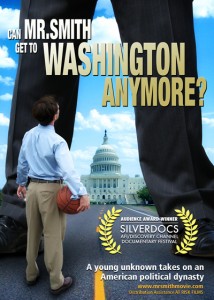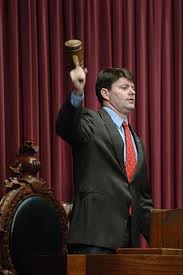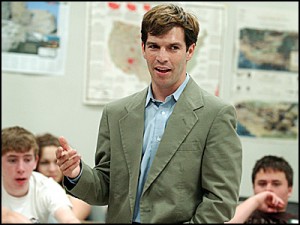The Missouri Senate – not the U.S. Senate – former U.S. Senator Jim Talent once told me, is the greatest deliberative body in the country today. Because any senator has the right to speak for as long as he chooses on any matter, each senator, even a freshman in the minority, can wield power if he plays the game well.
But I didn’t understand how to wield power when I got there. I would soon learn, though, from veterans like Senators Victor Callahan and Jason Crowell, and House Speaker Rod Jetton.
 When I came to the Senate, I aspired to be the young, liberal wunderkind that many journalists and activists had anointed me. In taking the unprecedented step of blocking a gubernatorial appointment before being sworn in, I sought to carve out an image for myself as a strong progressive, unafraid to stand up to the state’s most powerful Republican, Governor Matt Blunt. However, as I soon realized, the very image that helped me in my district was crippling me in the Senate.
When I came to the Senate, I aspired to be the young, liberal wunderkind that many journalists and activists had anointed me. In taking the unprecedented step of blocking a gubernatorial appointment before being sworn in, I sought to carve out an image for myself as a strong progressive, unafraid to stand up to the state’s most powerful Republican, Governor Matt Blunt. However, as I soon realized, the very image that helped me in my district was crippling me in the Senate.
My colleagues defeated nearly every proposal I offered during my first session, often with undisguised delight. I suffered so many defeats my first year – on amendments to restore funding cut from children’s health care, to enact an earned income tax credit for the working poor, to reveal an abstinence-only sex ed bill – that none really stood out.
All that stood out was a feeling of losing.
I hated losing, because I was very competitive. But I also saw the poverty and violence up close night in, night out, at neighborhood meetings and anti-gang marches, and that increased my sense of urgency.
I’d been in a hurry my whole life. But never did I feel such a sense of urgency as I did near the end of my first legislative session when I realized that as one of 34 senators able to change the state’s direction, I’d accomplished next to nothing. It was time to learn how to win.
******
To win – and to do so consistently – I knew that you needed to be either feared or loved. Respect wasn’t enough.
Term limits meant that no one was around long enough to be truly loved, and only a few were feared. I knew I wasn’t. For starters, I was too nice and I didn’t like pissing people off. Those who were feared didn’t care who they pissed off.
Second, I lacked institutional knowledge, both on policy or procedure. Without deep understanding of an issue and a firm grasp of Senate rules, it was hard to be feared on the Senate floor, where the action went down. Also, we (Democrats) were outnumbered 23-11, which didn’t help inspire fear. But after observing how Senator Crowell used the filibuster to great effect, I vowed that I would influence a policy debate in the same way sometime soon – and ironically, I got my first chance on one of Crowell’s own bills.
Crowell was best friends with House Speaker Rod Jetton, and was the Senate handler for the sole bill Jetton filed in 2007 – a bill to eliminate state taxation on all Social Security benefits reached the Senate. There was no coordinated Democratic strategy for dealing with the bill, so I asked the Minority Leader where she was on the bill, which was the centerpiece of the House Republicans’ agenda for the session. “Whose bill is it?” she sniffed.
“It’s Speaker Jetton’s.”
“Then Ah’m aginzit.”
Understanding that this would likely be the extent of the Leader’s engagement, and with most Democrats off the floor when Crowell brought the bill before the body, I stepped up. First, to indicate that I was serious, I asked the research staff to prepare 15 separate amendments for me, starting by exempting from taxation those with incomes under $50K, with amendments at successively higher figures. I offered the first one and engaged Crowell in a two-hour debate about tax policy, supply-side economics, and the national debt.
After a while Crowell asked if I planned to filibuster the bill. I don’t plan on allowing it to pass, in its current form, I said won’t pass as is. This signaled a willingness to negotiate, and Crowell stopped debate and motioned me into the Round Room – the small room behind the chamber where negotiations occurred.
At this point his countenance shifted from happy warrior to insolent teenager. “Go ahead, kill the bill,” he said. “I don’t care. Go ahead, kill it – it’d be political suicide. But it’s not my bill. I DON’T CARE.”
A minute later, Senator McKenna appeared. McKenna, a pro-life, pro-gun, pro-labor Democrat, was the only senator with 33 friends in the body – everyone’s favorite golf partner, softball teammate, and drinking buddy. Ryan’s father was Senate President Pro Tem of the Senate and consummate peacemaker, and Ryan is his father’s son. So when he saw me and Crowell in heated debate, he pulled me aside and asked, “What’s your problem with the bill?”
I told him I was fine with a tax cut for middle-class seniors who get double-taxed on Social Security, but that millionaires making six figures annually off investments don’t need a tax cut. He asked if I’d explained that to Speaker Jetton. “No, but there’s all the time in the world to discuss it on the floor,” I said archly.
McKenna hated filibusters. “Let’s go see Jetton,” he said.
***
 If there was one guy in the Legislature who was renowned for his mastery of the use of power, it was Speaker Jetton. His main strength was in, as he liked to say, not giving a shit. About anything. As a show of this, during times of tension between the House and Senate when neither chamber would take up work on the other chamber’s legislation, he would sometimes adjourn the House in mid-afternoon just to show that, well, he didn’t really care if anything passed. “Guvment’s big enough already, we don’t really need many more laws,” he’d chortle when asked why he’d adjourned after lunch.
If there was one guy in the Legislature who was renowned for his mastery of the use of power, it was Speaker Jetton. His main strength was in, as he liked to say, not giving a shit. About anything. As a show of this, during times of tension between the House and Senate when neither chamber would take up work on the other chamber’s legislation, he would sometimes adjourn the House in mid-afternoon just to show that, well, he didn’t really care if anything passed. “Guvment’s big enough already, we don’t really need many more laws,” he’d chortle when asked why he’d adjourned after lunch.
Sen. McKenna and I walked down to the Speaker’s office, and my friend state Rep. Rodney Hubbard, who was hanging out with Jetton, introduced us. Rod was a caricature: country-boy Marine-cum-realtor-cum-politician. He laughs and slaps me on the back, harder than I expected. “Ehna friendaHubs izza friendamahne!”
He took us into his enormous, well-appointed office, and asked what my problem with HB 444 was. “Well, Mr. Speaker, I just don’t see giving a tax cut to millionaires when we’ve just cut the working poor off health care.”
“Mmmm, Ah hear ya. But ol’ folks want it! We oughta do raght bah ’em! And it polls over 80%!” He winked.
“Mr. Speaker, I could support eliminating the tax on seniors with incomes under 50K, but not wealthy seniors.”
It was the first round of a marathon negotiating session that continued on the floor and off for 13 hours and culminated late that night with the passage of HB 444, which exempted people with incomes under $85K from state taxation on Social Security benefits. I wasn’t in love with the compromise, and neither was Crowell, but it passed 29-3, and for the first time, I was in the center of negotiations on a major bill.
***
The week after session, Jetton called me and invited me to accompany him in a statewide fly-around to promote the passage of HB 444. I declined. “Last thing I need in my district is a bunch of photo ops all over the state with you!” My district was about 2/3 minority and about 80% Democratic.
Rod laughed, then got serious.“Hmmm…well would it help if I trashed ya real good? Like, ‘We got a pretty good bill here, but it coulda been a heckuva lot better if that damn lib-rull nut Smith hadn’t screwed with it!’ How’s that? That the kinda thing ya lookin’ for?”
I laughed, “Nah, but I appreciate the gesture. Probably just best if you leave me out of it, ya know?”
The next time he came to town he met me out. We had drinks and recapped the session.
“You played the Social Security thing pretty smart,” he said. “I wanted the lib-rull nuts to kill it. Kill it and I pick up more seats next year.”
“Were you surprised I didn’t try?” I asked.
“Naw, I’se surprised you were straight though! I thought you were a gay lib-rull nut!”
“Seriously?”
“Yeah, then I see you got a girlfriend. But they say she’s just a cover.”
“Seriously?!”
“Smith, you mean to tell me you honestly didn’t know people say that? Hell, everybody thinks that.”
“Everyone? Or like, just a few people?”
“Everyone,” he laughed. “Don’t worry, I’ll defend ya. I’ll tell ‘em ya got a smokin’ hot girlfriend, tall with skinny arms!”
***
Over the next few years, Rod and I became unlikely allies on several issues – education reform, economic development, urban revitalization. Most of my friends couldn’t understand how I could work with him – let alone like him. Some pointed to the incident when he shouted at the Governor in the middle of the Governor’s State of the State address. Others assailed the unusual arrangement by which he served as a political consultant for several sitting senators whose legislation could not reach the Governor’s desk without his blessing. The first group said he was an ignorant right-wing hick. The second group said he was a brilliant Machiavellian hick.
I don’t know what happened on the night, years later, when Rod visited the home of a ladyfriend, a rendezvous that led to his political demise. I do know that it will haunt him for a long time. I also know that he is a better person today because of that night.
I tried to stand by Rod during his troubles as he stood by me, sending me long letters in prison about politics and policy, friendship and loyalty, mistakes and repentance. Perhaps more than anyone else who wrote me, he’d walked a day in my shoes. He was willing to explore that, willing to explain he found strength in dark times. He asked me the questions about prison that everyone else was scared to ask, which I found oddly refreshing. I wrote back that I was hanging in there, and that not even prison had turned me into the man he thought I was before he met me.
If his contributions to this blog can offer even one reader the kind of perspective that his letters offered me last year, they will be well worth it. I hope you take the time to read them.











Leave a Reply